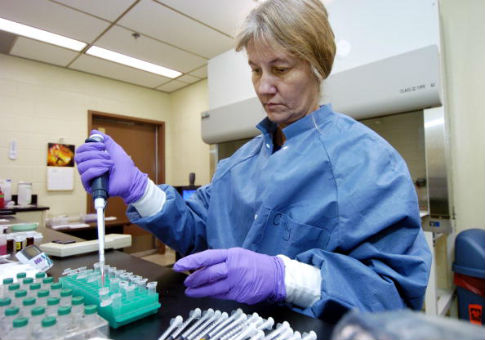Donald Trump's presidency has motivated the scientific community, especially female scientists, to expand their skill sets and enter the world of politics, with thousands considering runs for public office.
Erin Macdonald, education manager for World Space Week with a Ph.D. in astrophysics, has contemplated vying for a seat in the Colorado state Legislature, McClatchy reported Wednesday.
"What set the alarm bells off for people [in the science community] was how little the public trusts science," Macdonald told McClatchy. "I was talking to one of my friends at the women's march, and she said, 'I'm amazed at people carrying around signs that say 'Science is real.'"
Macdonald was also motivated to get involved in politics by the Trump administration's plans to cut funding to the Environmental Protection Agency.
Trump's budget proposal calls for cutting the EPA's funding by 31 percent, or $2.6 billion.
Macdonald has said she is "proud" to be among other women scientists protesting against President Trump. She has criticized several of Trump's policies, calling cuts to immigration and stricter visa qualifications a "huge brain drain."
Proud to be a part of this organization! #500WS | A day with the women scientists protesting Trump https://t.co/1IlCIrnjDT
— Erin Macdonald (@drerinmac) January 25, 2017
"If an opportunity to run for office comes, I'm going to jump on that," said Macdonald, who has intensified her political activism since Trump's inauguration in January.
Macdonald is the Colorado state coordinator for 314 Action, a nonprofit that recruits scientists to run for office. The group, named after the first three numbers in pi, provides scientists with proper training in speechwriting, campaign fundraising, and networking.
Shaughnessy Naughton founded 314 Action. While Naughton said the movement did not start with Trump, she indicated skepticism of climate change helped motivate her to become politically active.
"Politicians of all stripes like to selectively use the facts," she said. "We have politicians who refuse to look at the facts, and deny established ones like climate change. We can't control what they say, so we have to change who's elected."
Naughton, a chemist who unsuccessfully ran for Congress in 2014 and 2016, also argued that, because politicians "meddle" in science, scientists must enter politics.
"Traditionally scientists have looked at politics as dirty, and science as pure," she said. "The thought was, 'I don't want to get involved with that.' But we've seen that politicians are unafraid to meddle in science, and the only effective way to push back against that is having more scientists at the table."
Have a #STEM background? Are you ready to fight for #science, fact and reason? Sign up today. https://t.co/mo8iVcqgVp
— 314action (@314action) January 11, 2017
Since 314 Action began last year, more than 3,000 science and math professionals have expressed interest in running for office. Several hundred also signed up for the group's all-day web training session, called STEM the Divide, on March 14.
STEM stands for science, technology, engineering, and mathematics.
Sen. Bernie Sanders' (I., Vt.) lawyer during his 2016 presidential campaign, Brad Deutsch, leads a seminar on campaign finance law for the scientists.
McClatchy highlighted several female scientists who plan to run for public office in 2018. One of them, Jamie Tijerina, a Los Angeles resident who works in a cytometry lab, was elected to her neighborhood governance council and is researching moving into a higher political office.
"Tijerina thinks the major sense of urgency from the scientific community sprang from the Trump administration but that scientific perspective has been lacking in Congress for a while," McClatchy reported.
